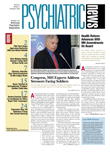Older Hispanic Americans who do not have enough money to cover their basic needs appear to be more vulnerable to cognitive decline than are older Hispanic Americans who have sufficient money for such needs.
So reported Natalie Sachs-Ericsson, Ph.D., a clinical psychologist at Florida State University, and coworkers in the September Journal of Aging and Health.
The study was based on data collected from 1993 to 1996 from a representative sample of about 3,000 community-dwelling Mexican Americans aged 65 or older living in five southwestern states.
Subjects' demographic and health information were collected. For example, subjects were asked questions about gender, age, education, and place of birth. To assess income, subjects were asked to select the income category that best represented their family income during the previous year.
Subjects also completed the Center for Epidemiological Studies-Depression Scale, which is a commonly used self-report instrument to evaluate depressive symptoms. In addition, they were asked whether they had ever been told by a doctor that they had had a heart attack, stroke, high blood pressure, diabetes, or cancer. Self-reported health problems have been found to have good agreement with both medical records and physician reports.
Information was also collected about whether subjects had trouble paying for basic living expenses such as food, clothing, housing, transportation, and health care. Subjects were given the Mini-Mental Status Examination to evaluate cognitive function, both at the start of data collection (1993-1994) and at the end of data collection (1995-1996).
The researchers then attempted to determine whether those subjects who had reported not having enough money to pay for their basic needs—59 percent of the sample—were more likely to experience cognitive decline over the two-year follow-up period than were the rest of the subjects. The researchers also considered possibly confounding factors such as educational level, depressive symptoms, and history of heart attack, stroke, high blood pressure, diabetes, or cancer.
Even when these potentially confounding factors were considered, those who had reported not having enough money to cover basic needs were significantly more likely to experience cognitive decline in the two-year follow-up period than were those who had reported having enough money.
The question, of course, is why?
The researchers suspect that there was a cause-and-effect association at work.
For example, if older Hispanic Americans did not have enough money to buy food, then inadequate nutrition might lead to a deficiency in B vitamins, the anti-oxidant vitamins C and E, and the anti-inflammatory omega-3 polyunsaturated fatty acids, which might effect cognitive decline.
Or if older Hispanic Americans did not have enough money to pay for health care or for medications, a lack of health care might increase progression of stroke, heart disease, or diabetes, which might lead to cognitive decline.
Or if older Hispanic Americans were chronically stressed by not having enough money to pay for the basics, the stress might make them vulnerable to cognitive decline. Indeed, there is evidence that chronic stress can damage neurons, especially in the hippocampus, which is vital to memory, the researchers pointed out. Also, there is evidence that stress can decrease brain-derived neurotropic factor (BDNF) in the hippocampus, and a paucity of BDNF has been linked to Alzheimer's disease. In brief, “having a problem with basic needs is a huge chronic stressor, which can affect the brain in bad ways,” Sachs-Ericsson noted during an interview with Psychiatric News.
If correct, the researchers' hypothesis—that inadequate money for basic necessities led to cognitive decline in many of their subjects—might have important public health implications, they believe. For example, if poor, older Hispanic Americans were given help in obtaining food, health care, and medications, they might be shielded to some extent from cognitive decline.
In any event, there is a pressing need to find ways to reduce the incidence of cognitive decline in the Hispanic-American population, Sachs-Ericsson and her coworkers concluded. Hispanic Americans are one of the fastest-growing segments of the U.S. population, Hispanic Americans appear to be more susceptible to Alzheimer's disease or dementia than are non-Hispanic white Americans, and Hispanic Americans seem to show symptoms of Alzheimer's seven years earlier than non-Hispanic white Americans (Psychiatric News, October 1, 2004).
The study was funded by the National Institute on Aging.
